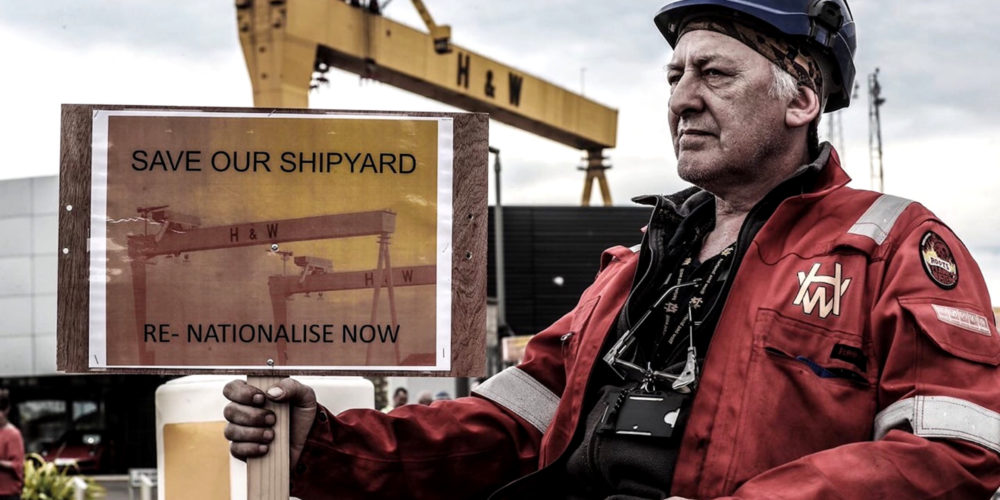A well-attended meeting organised by Unite in the Community, in conjunction with Communities Against Low Pay, was held in Dublin recently.
The aim of the meeting was twofold: to organise low-paid restaurant workers into a union, and to actively identify rogue employers who are exploiting workers by paying poverty pay and in many cases stealing the tips from waiting staff.
The campaign against the Ivy Restaurant, which steals its employees’ tips, was explained. One of the speakers was Julia Marciniak, a former member of the staff who was sacked for fighting back. Her dismissal is being fought by her union.
Councillor Cieran Perry explained that CALP is a grass-roots organisation for campaigning against low pay and organising actions during trade disputes when trade unions are banned from doing so, in particular by the Industrial Relations Act (1990).
Cieran described how CALP had been active during the Greyhound strike, the Lloyd’s Pharmacy strike, and Tesco strike. Not being part of the trade union movement or officially on strike, it was able to place pickets where the unions were forbidden, for example in shopping centres during the Lloyd’s and Tesco disputes. CALP members manned pickets and blocked bin lorries where unions were forbidden to.
There was a call for a radical trade union campaign to fight back against low pay and precarious employment. The question has to be asked, Are workers able to have a “radical trade union campaign”? Anti-worker legislation is so restrictive that if workers were to have such a campaign they would need a senior counsel in one hand and the 1990 act in the other in order to navigate all the legislation that is used to stop workers’ resistance.
Let us look at three issues discussed at the public meeting: the Ivy Restaurant, the minimum wage, and tip theft.
If there was no 1990 act when Julia was sacked from the Ivy restaurant her fellow-workers could have gone on strike and placed a picket on the restaurant immediately and shut it down. This could have brought the owners of this business to the negotiating-table. But under the 1990 act, single-worker disputes are drawn out for months, and by such time all the energy is gone out of the dispute.
Individual workers are at a huge disadvantage; but even a group of workers must now give a minimum of seven days’ notice, and have to abide by a huge amount of rules and regulations in the balloting of members, which often leads to long gaps between dispute and strike. This tips the balance of power firmly towards the employer—as it was designed to do.
When the Government refused to increase the minimum wage by 30 cents in the recent budget, low-paid workers on the minimum wage could have downed tools in a strike against the minimum wage. This too is outlawed under the 1990 act, as “political strikes” are banned.
The tips issue could have been dealt with in a collective manner. The workers in all restaurants that are stealing tips could have gone on strike in support of each other as an industry-wide strike. Restaurants not directly involved could have had support strikes. This would give the workers involved a much stronger position for fighting back against this outrageous policy that is now common all round the country.
“Social partnership” and its legislation, the Industrial Relations Act, has led to union density being at its lowest level in the history of the state, hovering around 24 per cent of the work force. Many of these workers are in their fifties, while younger workers coming through are not joining unions, so it’s on a downward spiral.
Many young workers have not even heard of trade unions: they hardly know they exist. This is because of the effects of “social partnership.” Unions are inactive and are not seen on the streets or on strike fighting for workers’ rights. Despite “social partnership” being abandoned many years ago, this mentality continues today, largely thanks to the anti-union legislation enacted as part of it, which restricts unions in taking strike action.
Under the voluntarist trade union system there is no right to union access; we do not have collective bargaining rights; and there is no right to union recognition.
We may have the right to join a union, but without these other rights it is akin to having the right to own a bike but not being allowed to cycle it. It puts handcuffs on workers.
We need to remove these handcuffs. Then, and only then, can workers take off their gloves, roll up their sleeves, and fight back. Then, and only then, can workers have a radical trade union campaign against precarious work, poverty pay, and all the other inequalities being imposed on the working class.
There is very little power in a union today. This power must be regained if we are to get a just share of the wealth that we produce. If we had 100 per cent union density without power we are fighting a losing battle.
What is needed is a radical workers’ rights campaign to tip the balance back in our favour.
We must fight to have the 1990 act abolished and take on the employers, with a ballot box in one hand and strike notice in the other.
Unions must become radical or become redundant.






